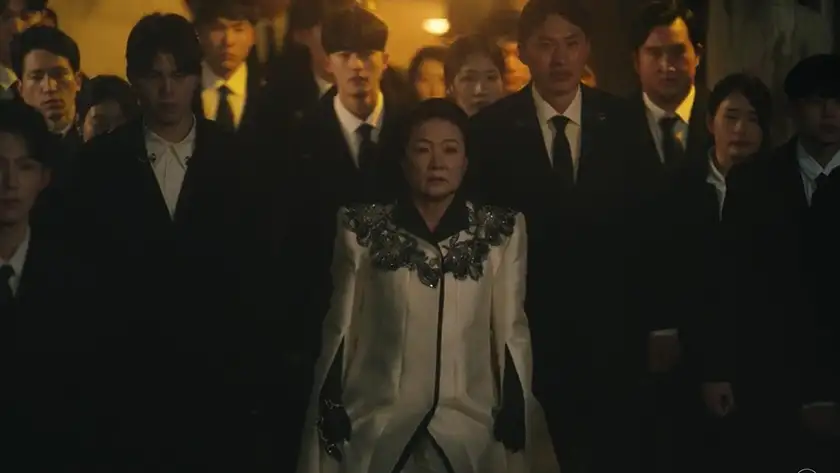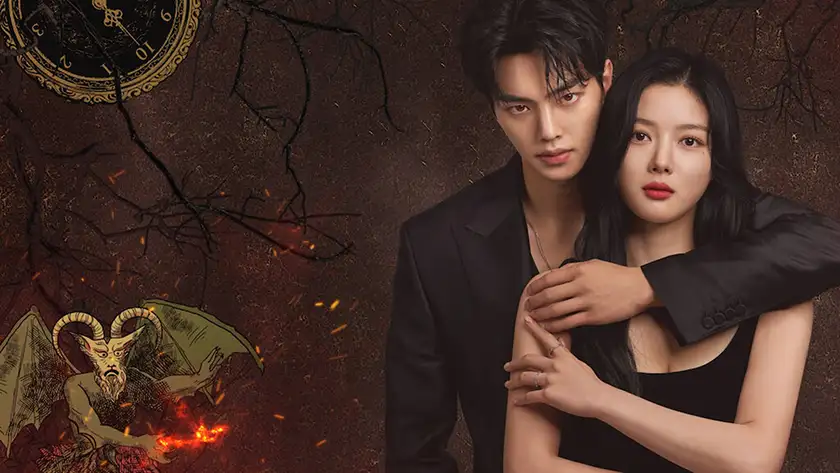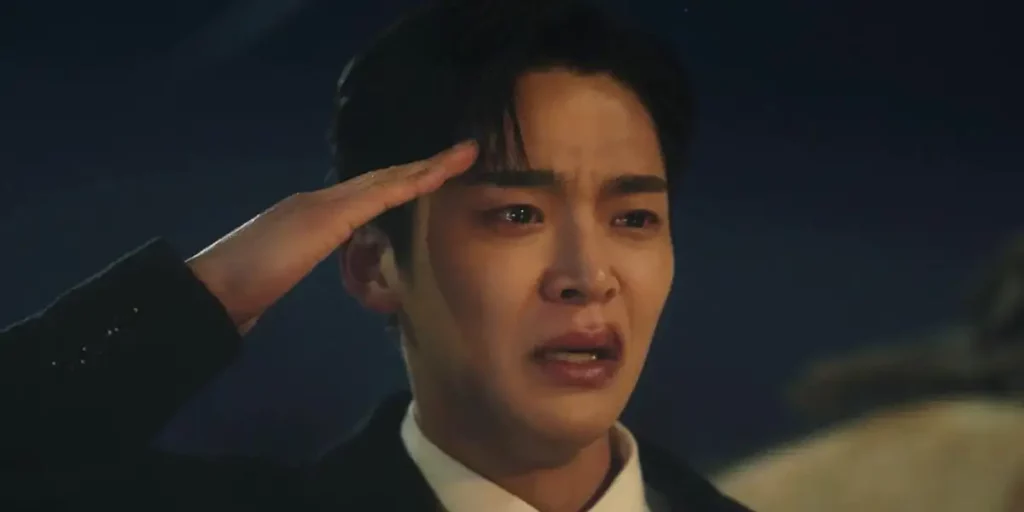Despite their playfulness, K-dramas just tell better stories than Western media, which consistently repackages the same narrative with no real innovation.
Flickering street lights illuminate a rundown alleyway, bathing it in eerie amber light. The sun has set, yet another chapter of Tomorrow (2022) has closed. An elderly man emerges onto the street, noticing that it’s lined with hundreds of bystanders, all dressed in formal black and white, standing to military attention. “I can’t believe so many people came just for me,” he tells the woman beside him, dressed in white with ornate, golden jewellery. After a brief moment, he turns and descends the hill, head held high despite others’ tears. After all, Jeon Moo-song is dead, and the people around him are grim reapers, ferrying him to the afterlife – crying is the only fitting thing to do at the end of this K-drama.
And yet, Jeon Moo-song is happy, a stark contrast to his feelings at the beginning of Tomorrow episode 6. When things kicked off, he was trying to take his own life, post-traumatic stress disorder riddling his weary body, flashbacks of the Korean War haunting his every waking moment. And yet, through the efforts of Choi Jun-woong (Rowoon), Koo Ryeon (Kim Hee-sun) and company, he moves onto the next life with pride. Safe to say, my emotions were in tatters.
And yet, as someone who has a Masters’ in War Studies, I’ve seen a thousand war movies. I wrote a dissertation on post-traumatic stress disorder in video games, and completed an entire course on media during the Vietnam War. While classics like Platoon or the woeful Boy in the Striped Pyjamas didn’t make me shed a tear, Tomorrow had me in pieces. And, when I thought about it a little more, that’s the case with a lot of K-dramas. Making me cry is a feat that Western media just can’t seem to achieve (which is probably, in some ways, a good thing), but my question is – why?

The answer is simple: K-dramas just tell better stories. While they’re oftentimes overdramatic, silly, and sensational, the core narratives that underpin Korean films and television shows just strike a chord with me. Take the ever-popular My Demon (2024), for example. I absolutely detest love stories. I’m a hardened cynic who prefers blood, guts, and gore to fluffy ‘awww’ moments, and yet My Demon ensnared me. It’s the conventional Romeo and Juliet with a macabre twist: he’s a demon, she’s a human – how can it ever work? Star-crossed lovers, except one can trap you inside a newspaper and steal your soul. If Shakespeare had done that, maybe I’d have paid more attention in English class.
Where the premise is a bit silly in many ways, and Song Kang and Kim Yoo-jung’s characters are hardly bastions of seriousness, beneath the surface there’s an actual story. It’s not just boy meets girl; it’s the real-life struggle of making a relationship work when two very different people are involved. It’s a story about the dangers of being a high-flying CEO in a cutthroat world. Where I find Western media can only hit one note – silly or serious, never in between – K-dramas somehow fuse comedic chaos with meaningful storytelling time and time again.
Sweet Home (2020), is similar. Song Kang’s first major outing may be marred by dubious CGI that is, at times, impossible to take seriously, but it’s underpinned by a thrilling horror narrative that isn’t just mindless violence. As humans transform into monsters left, right, and centre and the virus that’s driving them wild continues to decimate Korea’s population, there are infinite, branching, intertwining tales of survival, the pain of losing loved ones – brothers and sisters, daughters and boyfriends. There’s no going outside alone and inevitably being brutally murdered by whatever lurks in the shadows. No possessed nuns or haunted houses. There’s a story of pure human anguish that leaves you asking what choices you’d make if your loved one suddenly developed an uncontrollable nosebleed – kill or be killed, fight or flight.

I could go on and on, and list myriad examples, but my point remains the same: sure, there are K-dramas about people being turned into chicken nuggets, or Japanese scientists trying to create monstrous killing machines to help the Japanese war effort in World War II. But, in each of these seemingly ridiculous stories, there’s meaning. Where Western media feels like various shades of grey – superhero films, slasher flicks, rom coms – K-dramas innovate in ways that initially seem foreign, but somehow just make sense.
I’m not saying every TV show should be zany and weird – I love the likes of Breaking Bad, Game of Thrones, and other Oscar-worthy television – but I see innovation in K-dramas and movies that I just don’t see in Western media. For every exciting new show I see advertised, there are a dozen that make me roll my eyes and go ‘yeah, I’ve seen all of that before.’
It feels like, in many ways, uniqueness has unfortunately taken a back seat in the West, shrouded in the shadows, just like that alleyway in Tomorrow. I’m hoping 2024 gives me something that shifts that perspective – I have high hopes for Fallout, or Arcane Season 2. But, until then, give me Chicken Nugget.

